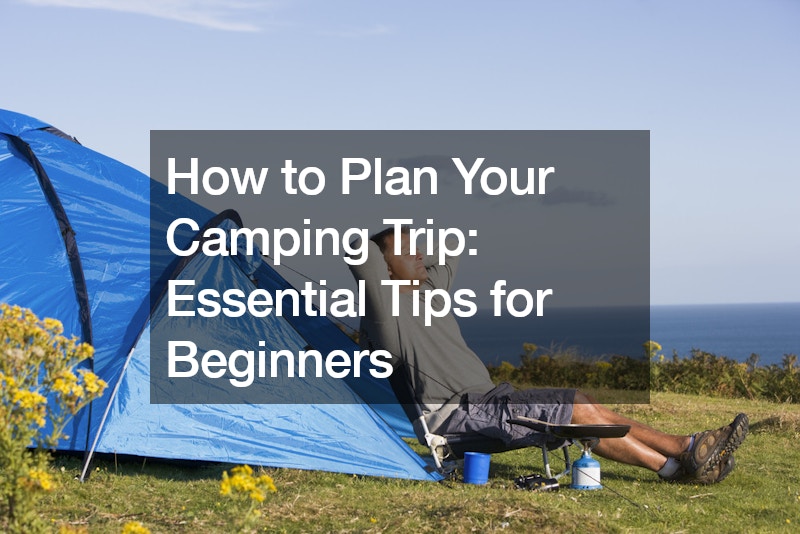Planning a camping trip can be an exciting adventure, but for beginners, it can also feel overwhelming. From choosing the right campsite to packing the essentials, there are several factors to consider to ensure a successful outdoor experience. In this guide, we’ll cover essential tips for beginners to plan their camping trip with confidence and ease.
1. Choose the Right Campsite:
Before embarking on your camping trip, research and select a suitable campsite. Consider factors such as location, amenities, and activities available.
Many campgrounds offer facilities like restrooms, showers, and fire pits, which can enhance your camping experience, especially for beginners. Look for campsites with designated tent areas and level ground for easy setup.
2. Check Campground Regulations:
Each campground may have specific rules and regulations that campers must follow. Before your trip, review the campground’s regulations regarding check-in procedures, quiet hours, and firewood collection. Some campsites may require reservations in advance, while others operate on a first-come, first-served basis. Additionally, be aware of any fire restrictions or bear safety protocols in place.
3. Plan for Facilities and Amenities:
Depending on the chosen campsite, facilities and amenities may vary. Some campgrounds offer potable water, picnic tables, and trash receptacles, while others may have more primitive amenities. If amenities like drinking water or restroom facilities are limited, be sure to pack accordingly. Consider bringing a portable water filter or purification tablets and a portable toilet if necessary.
4. Check Weather Conditions:
Checking the weather forecast before your camping trip is essential for planning and preparation. Be aware of potential weather hazards such as thunderstorms, high winds, or extreme temperatures. Pack appropriate clothing and gear for the forecasted conditions, including rain gear, warm layers, and sunscreen. Additionally, have a backup plan in case of inclement weather, such as indoor activities or alternative camping locations.
5. Pack the Essentials:
Creating a packing list is crucial for ensuring you have everything you need for a comfortable camping experience. Essentials include shelter (tent or camping hammock), sleeping gear (sleeping bag, sleeping pad), cooking equipment (camp stove, utensils), food and water, clothing, and personal items (toiletries, medications). Consider investing in a quality hunting backpack or camping backpack to organize and carry your gear efficiently.
6. Practice Leave No Trace Principles:
As stewards of the outdoors, it’s essential to minimize our impact on the environment while camping. Follow Leave No Trace principles, which include packing out all trash, minimizing campfire impacts, respecting wildlife, and staying on designated trails. Leave the campsite better than you found it for future campers to enjoy.
7. Prepare for Emergencies:
Safety should always be a top priority when camping. Before your trip, familiarize yourself with basic first aid procedures and pack a well-stocked first aid kit. Additionally, ensure you have communication devices such as a fully charged cell phone or two-way radio in case of emergencies. Let someone know your itinerary and expected return date in case of unexpected situations.
8. Enjoy the Experience:
Above all, remember to enjoy the experience of camping in the great outdoors. Disconnect from technology, take in the sights and sounds of nature, and embrace the simplicity of outdoor living. Whether it’s roasting marshmallows over a campfire, stargazing under the night sky, or embarking on a hike through the wilderness, camping offers endless opportunities for adventure and relaxation.
Safety Tips for Camping Beginners
Camping in the great outdoors can be an exhilarating experience, but it’s essential to prioritize safety, especially for beginners. Here are some crucial safety tips to keep in mind:
1. Research the Area: Before heading out, familiarize yourself with the terrain, weather conditions, and any potential hazards of the camping area. Check for local wildlife and be aware of any recent weather forecasts or warnings.
2. Pack Essential Safety Gear: Always carry a first-aid kit, a flashlight or headlamp with extra batteries, a multi-tool, and a map or GPS device. These items can be invaluable in case of emergencies or unexpected situations.
3. Practice Campfire Safety: Build campfires only in designated fire pits or areas and never leave them unattended. Keep a bucket of water or a fire extinguisher nearby to quickly extinguish any flames.
4. Wildlife Awareness: Be respectful of wildlife and keep a safe distance from wild animals. Store food securely in airtight containers or bear-proof canisters to prevent attracting unwanted visitors to your campsite.
5. Stay Hydrated and Sun Protected: Drink plenty of water to stay hydrated, especially in hot weather. Wear sunscreen, sunglasses, and a wide-brimmed hat to protect yourself from the sun’s harmful rays.
By following these essential tips, beginners can plan and prepare for a memorable camping trip that fosters a love for the outdoors and creates lasting memories. With proper planning and a sense of adventure, camping can be an enjoyable and rewarding experience for outdoor enthusiasts of all levels.
.


